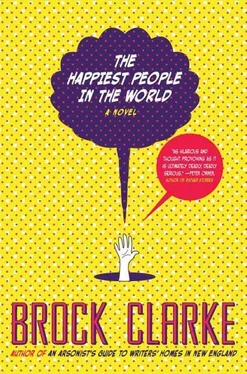“Did you get my note?” Joseph said.
“Your note,” Henry repeated. He’d received probably a dozen notes that day — from students, teachers, secretaries — and each time the note sender had followed up with a personal visit. And why did Americans, or at least Broomevillians, always do that? They would send Henry a note or an e-mail, or leave him a phone message, and then come to him in person and ask whether he’d gotten their note, e-mail, or phone message.
“My note,” Joseph said, whispered actually. The words seemed to cause him some discomfort: he wiped the sweat away from his hairline and bent over at the waist, either in an attempt to get closer to Henry or in reaction to a stomach pain — Henry honestly couldn’t tell which. “Under your door at the Lumber Lodge,” Joseph whispered.
“Your note,” Henry said, finally remembering the note he’d woken up to yesterday morning. He took a step back; Joseph took a step forward and then closed the door behind him. He was wearing a blue uniform onto which were stitched many badges onto which were stitched many initials. He was also wearing a thick belt with many holsters: in one was a radio of some kind; in another, a black stick or club; in yet another, what looked to Henry like an actual gun, although it was probably fake. In thinking this, Henry was still properly Danish: to citizens of countries where gun ownership is looked down on and in any case pretty much impossible, all guns looked like they were probably fake guns. Even though Henry was fully aware that lots of people in Broomeville owned and carried real guns, and he wasn’t aware of a single person who owned and carried a fake one. And then Henry put up his hands, even though Joseph’s gun was still in its holster, and blurted out the thing he’d been trying not to say but also had been really desperate to say ever since he’d first arrived in Broomeville two years earlier: “I’m Jens Baedrup.”
“Well, yeah,” Joseph said.
“Don’t kill me,” Henry said, and when Henry said that, Joseph doubled over, in genuine agony now, no fooling. He cradled his stomach with his right arm while he groped around with his left until he found a chair. And into the chair he fell, hunched over, moaning.
“I’m not going to kill you,” Joseph said. “Why would you even say that?”
Henry was sitting behind his desk now. He’d placed his satchel on the desk. Inside the satchel was Joseph’s note, now crumpled. Henry extracted it, placed it on the desk, smoothed it. “I understood this as a death threat,” Henry said.
“What?” Joseph said. He leaned forward to get a better look at the note, the name, the big black X. “Well, you know what, I can kind of see where you’re coming from,” Joseph said. “It’s that X, isn’t it?”
“Yes,” Henry said. “Did you not mean it to be menacing?”
“No,” Joseph said. He looked at the note, thinking. “Kind of,” he said. Henry sat back in his chair, arms across his chest now. He was used to this kind of stammering as students haltingly made their way toward their true meaning. “It actually has a double meaning,” Joseph said. Now he looked more proud than pained. It was that look that students get when they realize they’ve grasped what heretofore had seemed like a forbiddingly foreign concept. Henry knew that when Joseph had said “double meaning,” what he’d really wanted to say was “double entendre.” But he hadn’t. Who knew why. He’d probably been uncertain about how thickly he was supposed to apply the French pronunciation. “The first meaning is, don’t mention the name Jens Baedrup again.”
“OK.”
“And whatever you do, stop telling people that the stranger’s name is Jens Baedrup.”
“Is this the second meaning?”
“No, this is still the first,” Joseph said. “Do not mention the name Jens Baedrup. Do not say you are Jens Baedrup. And definitely do not say that Søren Korkmaz’s real name is Jens Baedrup.”
“Søren Korkmaz,” Henry said.
“Søren Korkmaz is the man who burned your house down, and when he found out you were still alive, he came here to kill you. And now he’s dead.”
That was the second meaning. Henry understood that, without Joseph having to tell him so. Henry also understood that Joseph had killed him. He knew this because Joseph was starting to sweat and moan again, but also because this was the way students, and perhaps all people everywhere, confessed: they told you one thing that seemed big enough but that was only in preparation for the truly large confession to come. Henry kept his arms crossed, kept frowning, waited.
“I killed him,” Joseph said.
“I’m sorry,” Henry said. Although that wasn’t quite right. “Thank you,” Henry said. Although that wasn’t quite right, either. What do you say when, after four years of running and wondering and hiding, you learn the name of the person who’d tried to kill you and also that that person is dead? Henry tried to picture a cartoon that would do justice to the feeling. But he couldn’t. The part of him that could think of cartoons that would do justice to anything was gone. Perhaps it had never existed. Certainly, Ilsa had thought so. He was sure Locs had thought so, too.
“Are you working for Locs?” Henry asked. And when he did so, Joseph straightened up somewhat. “Well. .,” he said, and then he scooted forward in his chair, and that’s when Henry recognized him. The scooting, the headphones, the sweatshirt, the air guitar, the Stevie who was not Stevie Wonder. Joseph had been the man on the bus that had brought Henry to Broomeville. Although Joseph’s hair had been much longer back then.
“You got a haircut,” Henry said, and Joseph nodded, ruefully ruffled the back of his head.
“He doesn’t feel like me.”
“Who?”
“The guy with this haircut.”
“Why did you get it cut?”
“Capo made me,” Joseph said.
“Capo?” Henry said, and then he thought Joseph was actually going to put his hands over his mouth, but he didn’t. “Listen,” Joseph said, “about Locs. .” But then he stopped, head cocked, as though he’d heard something. Joseph got up, opened the office door, stuck his head out into the hallway, looked one way, then the other. Then he stuck his head back in, turned to Henry. He looked different now. His eyes were big. “Someone was out there,” he said.
“Who?”
“Jenny.”
“Jenny Tallent?”
“Yes,” Joseph said. He looked down, thinking, thinking. “Now, Jenny’s a good girl,” he said, more to himself than to Henry. In any case, that uttered sentence seemed to decide something for Joseph: he took his gun out of his holster, put it on Henry’s desk, pushed it toward Henry. Henry didn’t touch it. Just a few weeks ago, Henry and Ellen had watched a movie in which a police detective had placed his gun on a table, pushed it toward the criminal sitting across the table. “Go ahead, take it,” the detective had told the criminal, and when the criminal had tried to go ahead and take it, the detective had shot him with his other gun.
“Go ahead, take it,” Joseph said.
“But it’s your gun,” Henry said.
“I don’t even want it anymore,” Joseph said. Quickly, quickly, Joseph picked up the gun he’d just given Henry and showed him how to use it. Then he put it back on the desk. “Got that?” Joseph said. Henry nodded. It wasn’t hard. Any idiot could do it. Not that he was going to.
“I’m not going to use that gun.”
“But you might have to.”
“Why?”
“Oh, I can think of lots of reasons,” Joseph said. And with that, he got up and left the room, and also left the door open. Henry was suddenly highly conscious of a gun sitting on his desk where anyone could see it. He was also conscious of really not wanting to touch the gun. He picked up the note, then used it to pick up the gun, then deposited both in his coat pocket. Henry closed his office door behind him and walked toward the auditorium. It was three thirty when he arrived. The band concert was almost over. The band was playing its last song. Henry recognized it right away. It was that famously plaintive rock-and-roll song about swimming in a bowl with fish and wishing people were there. Henry looked for and then spotted Ellen, sitting next to Matty near the front of the auditorium. I’m here, he wanted to shout but didn’t. Ellen didn’t seem to be looking for him anyway. She was looking at the stage. Henry looked, too, and saw Kurt stand up and begin playing a mournful solo on his trumpet. It really was beautiful, and suddenly Henry was trying hard not to cry. Schoolchildren’s band concerts do strange things to the adults in the audience. Don’t cry, Henry told himself. And then, to Søren: I’m sorry you’re dead, but I’m glad I’m not. I’m glad that’s all over. And to Ellen: I’m going to marry you tomorrow. And then to Kurt: I’m sorry I thought you were the person who wrote the note. I’m sorry I didn’t trust you. And then came the chorus, and all of a sudden, many people in the audience were singing it. Henry could see that Ellen and Matty were singing it, and he started singing it, too: “How I wish, how I wish you were here,” he sang, and then he really did start crying. Harder than he’d ever cried before. But why? Everyone that mattered to Henry was here. There wasn’t anyone to miss. Was there? Who was here? Who was not here?
Читать дальше












